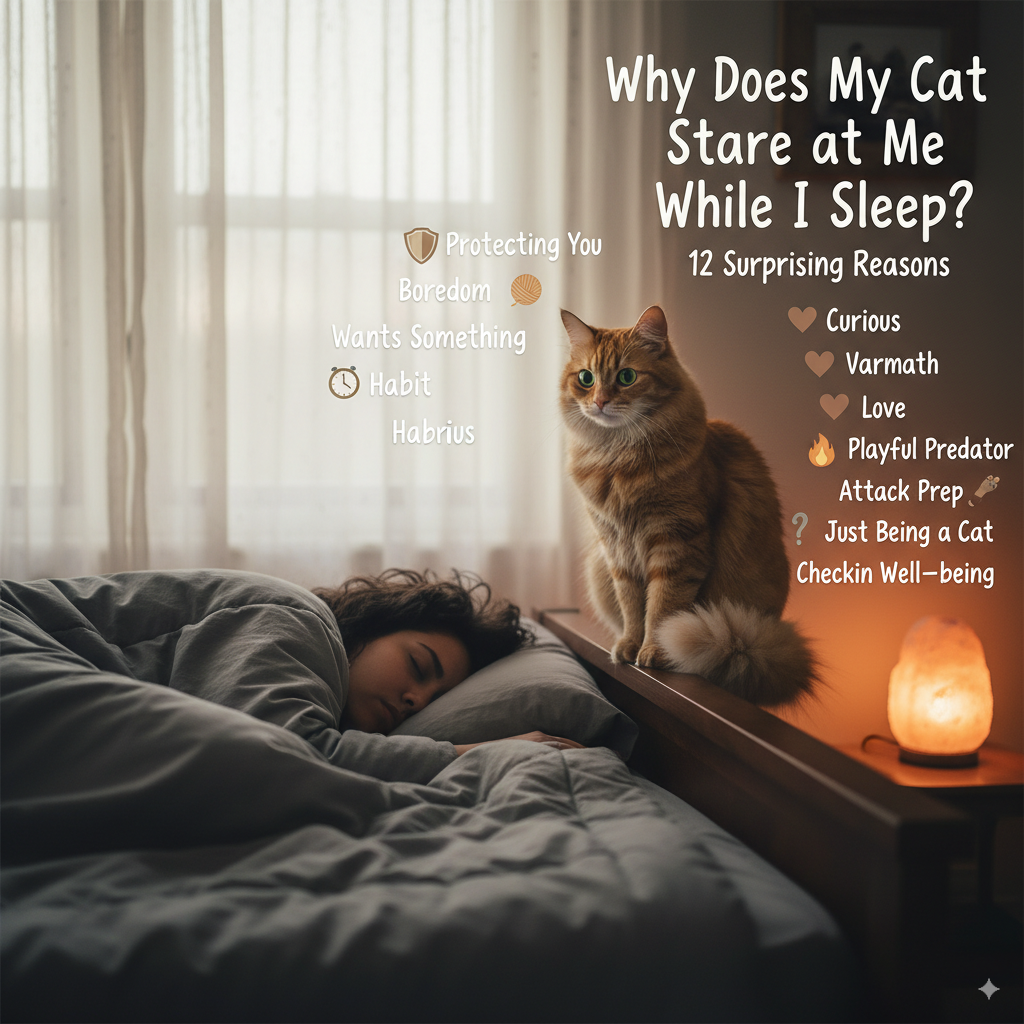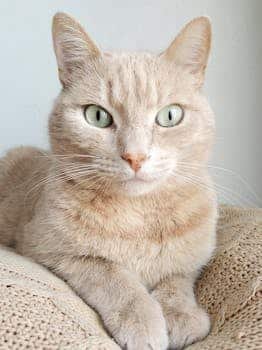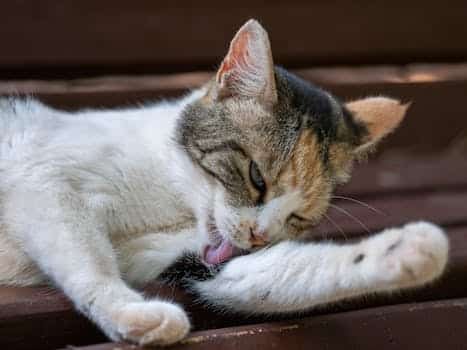Post Disclaimer
Catopedea shares information for educational and general interest purposes only. Our content is not a substitute for professional veterinary advice, diagnosis, or treatment. Always consult a licensed veterinarian for concerns about your cat’s health, diet, or behavior.
Have you ever opened your eyes in the middle of the night only to see your cat staring straight at you? It can feel a little spooky – like something out of a movie – but for cat owners, it’s a surprisingly common experience. While it may seem mysterious, most of the time your cat’s gaze has less to do with plotting world domination and more to do with love, curiosity, and instinct.
Quick Answer: Cats often watch their owners sleep out of affection, curiosity, or habit. In most cases, it means they feel bonded and safe with you. Sometimes, however, the staring can signal boredom, hunger, or a desire for attention.
Cats are observant creatures. Their sharp senses, natural routines, and deep bonds with humans often explain this quirky behavior. Understanding why cats stare at you while you sleep not only eases your mind but also helps you strengthen your connection with your feline friend.
In this guide, we’ll look at 12 common reasons cats fix their eyes on their sleeping owners, along with practical tips to handle it if the staring ever feels unsettling..
12 Surprising Reasons, Why Does Your Cat Stare at You While You Sleep

1. Pure Affection and Bonding
One of the most heartwarming explanations is simply love. Cats often show affection through small, subtle behaviors – and watching over you while you sleep can be one of them.
- A sleeping human feels safe and non-threatening, so cats are more relaxed staying close.
- Cats sometimes pair staring with slow blinking (known as “cat kisses”), which is their way of showing trust.
- Rescue cats or kittens raised closely with humans often develop this habit as a comfort ritual.
Owner tip: If your cat stares and slow blinks, try returning the gesture. According to International Cat Care, cats often respond positively to slow blinking, strengthening your bond.
(Related: Decoding Cat Eye Language)
2. Hunger Cues or Routine Reminders
If your cat tends to stare at you at dawn, it might not be love – it might be breakfast. Cats are experts at learning routines, and if you usually feed them after waking, they’ll quickly associate your movement in bed with food.
- Staring may be followed by paw taps, nudging, or vocalizing if you don’t respond.
- Cats can even adjust their internal clocks to anticipate feeding time.
Owner tip: If early-morning staring disrupts your rest, try an automatic feeder. Cornell Feline Health Center notes that consistency in feeding schedules helps cats feel secure.
3. Curiosity About Your Movements
Cats are naturally curious, and your body is full of interesting movements during sleep – the rise and fall of your chest, twitching fingers, or shifting under blankets.
- Kittens may escalate from watching to playful pounces.
- Adults may simply find it entertaining to observe.
Owner tip: Add a short evening play session with a wand toy before bed to reduce nighttime restlessness. ASPCA recommends daily play for indoor cats to meet their hunting needs.
4. Guarding and Protection Instincts
Cats can be surprisingly protective of their humans. In multi-cat homes, one often acts as the “guardian,” watching from a spot with a clear view of both you and the door. Even solo cats may adopt this role.
This protective instinct traces back to wild cats, who had to remain alert even while resting. By watching you, your cat may be acting as a tiny bodyguard.
5. Comfort in Your Presence
For many cats, being near you provides a sense of comfort and safety. Staring while you sleep may simply be their way of soaking in that security.
- Your scent and warmth are reassuring.
- Cats bond strongly with their primary caregiver, and watching you may be part of that attachment.
(Related: Why Cats Follow You Everywhere)
6. Night Vision Advantage
Cats are well equipped to see in the dark thanks to a reflective layer in their eyes called the tapetum lucidum.
- They notice tiny twitches or shifts in your body that you may not even realize.
- Since cats are crepuscular (most active at dawn and dusk), nighttime is their prime observation window.
From your perspective, it may feel eerie. For your cat, it’s completely normal.
7. Learned Habit From Kittenhood
Kittens spend much of their early life studying their mothers. Watching you while you sleep may be a leftover instinct – you’ve simply replaced their feline mom as the center of their attention.
This is especially common in cats raised closely with people from a young age.
8. Hunger for Attention (Not Just Food)
Sometimes the staring has nothing to do with meals – it’s just your cat wanting your attention.
- Indoor cats may watch and wait for interaction.
- If ignored, the stare may turn into paw taps, meows, or gentle nudges.
Owner tip: Enrichment toys, scratching posts, and playtime during the day help reduce attention-seeking at night.
9. Anxiety or Stress Signals
Cats experiencing anxiety may become more clingy. Staring at you during sleep can be a way to self-soothe or seek reassurance.
- Common triggers: moving homes, new pets, loud noises, or routine changes.
- Anxious cats may also show signs like hiding, over-grooming, or vocalizing.
If the staring comes with other changes, consult a vet. VCA Animal Hospitals emphasizes that sudden behavior shifts often signal stress or health issues.
10. Health-Related Concerns
While rare, excessive staring can sometimes point to underlying health problems. Cats are experts at hiding discomfort, so they may act more watchful when unwell.
- Conditions like arthritis, thyroid imbalances, or pain can increase clingy behavior.
- A sudden spike in nighttime staring – especially with restlessness or vocalizing – deserves attention.
11. Scent and Familiarity
Cats rely heavily on scent for bonding. Your sleeping body radiates warmth and familiar smells, which may draw them close. Watching you may simply be their way of enjoying that comfort.
12. Spiritual or Symbolic Meaning
Beyond science, cats have carried symbolic roles for centuries.
- Ancient Egyptians revered cats as guardians.
- In folklore across Europe and Asia, cats symbolize mystery and luck.
- Spiritually, some believe cats watch over human energy during vulnerable times like sleep.
(Explore more: The Spiritual Significance of Cats)
What to Do If Your Cat’s Staring Bothers You
While harmless, late-night staring can feel unsettling. Here are ways to manage it:
- Set feeding routines with scheduled meals or automatic feeders.
- Add play sessions before bed to tire out your cat.
- Provide cozy alternatives like a cat bed near yours.
- Close your door if needed for uninterrupted sleep.
- Offer enrichment during the day to reduce nighttime restlessness.
When to Worry
Most staring is affectionate or instinctive. But check with a vet if:
- Your cat suddenly stares obsessively.
- It’s paired with clinginess, pacing, or vocalizing.
- Other symptoms appear (loss of appetite, changes in litter use, lethargy).
International Cat Care advises owners to treat sudden changes as potential health signals.
FAQs About Cats Staring While You Sleep
1. Is it normal for cats to stare at their owners while they sleep?
Yes, it’s very common and usually harmless. Cats often stare out of affection, curiosity, or habit. This behavior is part of how they bond with their favorite human.
2. Do cats stare because they’re hungry?
Often, yes. Staring can be their early “breakfast reminder.” If your cat regularly watches you in the morning, it’s usually a sign they expect food. Keeping a consistent feeding schedule can help reduce this.
3. Why does my cat only stare at me, not other family members?
Cats usually bond most strongly with one caregiver often the person who feeds, comforts, or spends the most time with them. That bond explains why your cat chooses you as their main focus.
4. Do cats watch over humans at night?
Many owners believe so. Instinctively, cats may act as guardians of their territory, which includes you. While it may not be true “protection,” it often signals they feel safe and bonded to you.
5. Can I train my cat not to stare at me while I sleep?
Yes. Engage your cat with play sessions before bed, stick to regular feeding times, and provide cozy sleeping spots nearby. These steps can redirect their attention and make nights more restful.
6. Is staring ever a health concern?
It can be if it’s sudden, obsessive, or paired with other symptoms like lethargy, appetite loss, or confusion. In that case, it’s best to consult a vet. Learn more in PetMD’s guide to cat behavior changes.
7. Why does my cat stare at me without blinking?
A fixed, unblinking gaze often reflects curiosity or focus. When paired with relaxed body language, it’s usually harmless. If your cat looks tense or aggressive, however, it may mean they’re overstimulated.
8. Do cats stare for spiritual reasons?
Some traditions suggest cats act as guardians of human energy and bring protection during rest. Learn more in our guide on the spiritual significance of cats.
Conclusion
Cats may feel mysterious, but even their strangest behaviors usually make sense once you look closer. Staring at you while you sleep is often a mix of instinct, affection, and curiosity – with a dash of folklore and symbolism for those who believe in it.
If the behavior feels disruptive, simple changes like structured feeding, evening play, or cozy sleeping spots can help. And if it ever seems excessive or unusual, it’s worth checking with your vet.
So the next time you wake to glowing eyes in the dark, take comfort: your cat may just be showing love, standing guard, or waiting patiently for their morning meal.



Pingback: Why Does My Cat Bite My Ankles? 7 Common Reasons - catopedea.com
Pingback: Odd Cat Behavior: 28 Strange Things Cats Do Explained - catopedea.com